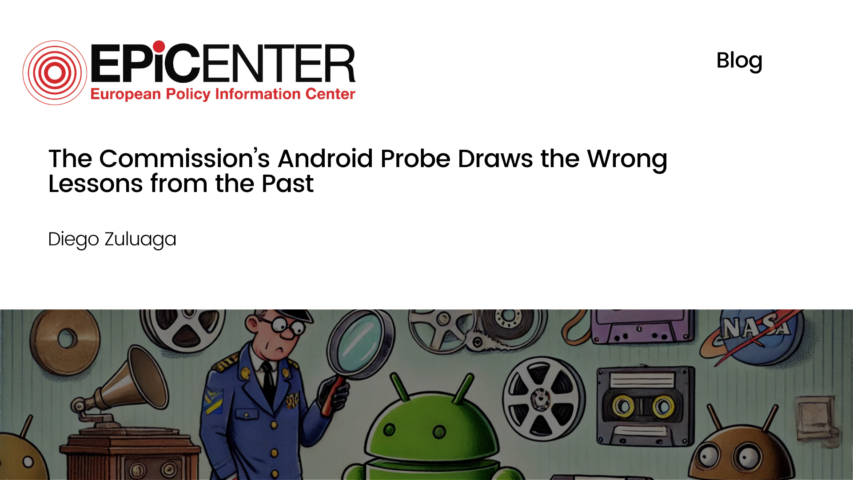The Commission’s Android Probe Draws the Wrong Lessons from the Past

The Commission’s Android Probe Draws the Wrong Lessons from the Past
Diego Zuluaga // 18.04.2016
It is expected that the EU’s competition authorities will this week issue Google with a formal charge sheet, known as a statement of objections, concerning its Android mobile software. This move follows an investigation launched just over a year ago to examine whether Google’s practices on smartphone software and apps breached EU antitrust rules. Back then, a separate charge sheet addressing Google’s practices in general search was issued by the Commission. The latter probe is ongoing – and you can read more about its flaws here.
The Commission’s competition stance with regard to the innovative industries was shaped by the Microsoft case more than a decade ago, and some are drawing parallels to this landmark ruling in discussions of the Android probe. Superficially, the two cases might appear quite similar: a leading established giant with substantial market share is accused of tying other products to its software in a bid to expand its dominance to adjacent markets, thereby hampering the competitive process.
Yet, whether one agrees with the Microsoft ruling or not – and I am sceptical – on closer inspection it becomes quite clear that the arguments used by the Commission back then do not apply to Android. Google’s mobile software is open-source, which means that it is freely available and modifiable by programmers. This gives phone manufacturers and app developers greater choice in how they use and operate on Android.
The Commission is worried that Google is forcing smartphone manufacturers to pre-load Google apps together with the Android software they use. Competition officials fear that such requirements would tilt the playing field against competing apps and reduce consumer welfare. However, there are several examples of smartphones that use Android software without Google apps, in markets such as Russia and France. Furthermore, any individual user is able to turn off apps and download new ones, as well as to customise their home screens as they see fit.
Competition authorities are right to worry about the welfare of consumers and the state of competition in digital markets. But one should not overhype the danger of anti-competitive practices – there is plenty of flexibility and choice in mobile software. The stats corroborate this: smartphone adoption is close to becoming universal, the number of apps and app downloads is rapidly increasing, and users are spending an ever greater proportion of their online time on mobile devices. Oh, and app revenues are rising as rapidly in Europe as elsewhere in the world!
But the EU competition watchdog is not only wrongly applying arguments from the past to current issues. Commissioner Vestager and her team are also missing what is arguably the most important lesson of the Microsoft investigation, namely, that even the strongest of dominant positions is fragile and ephemeral in the digital age. Indeed, examples of fallen giants other than Microsoft’s own Windows software abound – Blackberry and Nokia phones, for instance. As Geoff Manne over in the States has argued, it is not just that today’s leaders “might not” be tomorrow’s leaders, but that they quite definitely will not be.
There is, in fact, reason to believe that competition in the digital sphere is becoming more varied and fierce than ever before. Just as new technology-enabled services are bringing much-needed competitive pressure to ossified offline sectors, the growth of multi-sided platforms is slated to usher in more diversity and choice for end users as well as app developers and others along the digital value chain. What we are beginning to witness is the growing importance of platform competition in digital markets – not Google competing with Yahoo and Bing, but Google competing with Amazon – which in turn is competing with Uber in delivery and transport – and Facebook for users’ eyeballs and online purchases.
By the same reasoning, Android – a platform in its own right – competes not just with Apple’s iOS and so-called ‘forked’ – customised – versions of Android, but also with Windows and other PC software, and whatever other ecosystems Amazon and Facebook – and others – may be working on. But we cannot predict who the next Android will be, not least because it is likely to come from outside the narrow market we think of when we think of Android.
There is an additional reason for caution when it comes to regulatory interventions on grounds of competition on multi-sided platforms such as Android. Namely, that what appears anti-competitive on one side of the market – app developers and phone manufacturers in this case – may well be pro-competitive on the other side – end users – by resulting in lower prices or greater access to online services. The presumption against intervention because of the probability of antitrust error – a well-established precept of modern competition policy – is magnified in multi-sided markets, which by definition are more complex and sophisticated.
All in all, there really are no persuasive arguments which would warrant action by the Commission on Android. At any rate, I look forward to responding to its statement of objections later this week.
EPICENTER publications and contributions from our member think tanks are designed to promote the discussion of economic issues and the role of markets in solving economic and social problems. As with all EPICENTER publications, the views expressed here are those of the author and not EPICENTER or its member think tanks (which have no corporate view).



